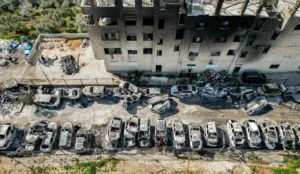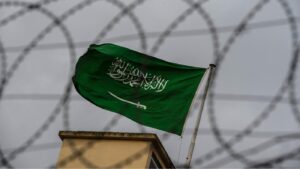
The National Interest Foundation Newsletter
Issue 181, March 3, 2023
Welcome to our NIF Newsletter. In this week’s headlines: we analyze the meeting between Bashar Al Assad and senior Arab lawmakers, examine the attacks on Palestinians by Israeli settlers, and look into the recent trial of former Saudi judges.
Arab Lawmakers Visit Syria

The recent meeting between Assad and high-level Arab leaders indicates warming relations. (Photo from AFP)
Bashar al-Assad Meets with Senior Arab Lawmakers in a Sign of Warming Relations After Decades of Isolation for Syria
The meeting that occurred between Syrian President, Bashar al-Assad, and a distinguished coterie of Arab legislators hailing from Oman, Lebanon, Iraq, Jordan, Palestine, Libya, Egypt, and the United Arab Emirates, signals a momentous occasion for Syria – one that breaks through years of being relegated to the fringes of the international community. This confluence of events hints at a thawing of relations between Syria and its Arab counterparts, portending a surge of opportunities for the country and its authoritarian leadership.
The meeting between Arab lawmakers and Syrian with al-Assad suggests that there is growing acceptance and partnerships between authoritarian regimes in the Middle East. This trend began to show after the Arab Spring, when many authoritarian regimes in the area, frightened by the prospect of a similar revolutionary movement, began working together to help each reinforce the power of their authoritarian regimes and undermine democratic movements in the region. This network of dictators has been slowly but steadily growing. The meeting with the Arab lawmakers is a significant boost for al-Assad, who has faced significant isolation from the Arab world since the 2011 uprisings against his government. The Arab League expelled Syria from the organization in 2011, and other Arab nations recalled their ambassadors from Damascus. This isolation made it difficult for Syria to access international aid, trade, and investment, making it challenging for the country to rebuild after years of war. Assad was welcomed in Abu Dhabi and Dubai last year on his first trip to an Arab country since the start of the war, and the UAE restored its Syrian embassy in 2018.
In a remarkable display of solidarity, Arab nations have rallied behind Syrian President Al-Assad in the aftermath of the devastating earthquakes that rocked Syria in February, claiming the lives of over 5,900 people. Countries such as Saudi Arabia and the United Arab Emirates, who previously supported rebels in their bid to overthrow Al-Assad during the early stages of the Syrian crisis, have contributed aid to the country. This outpouring of support has been further reinforced by the upcoming visit of Egyptian Foreign Minister Sameh Shoukry to Damascus – the first visit by an Egyptian foreign minister to Syria since the crisis began in 2011. Shoukry’s visit aims to extend a message of compassion and solidarity from Egypt to the people of Syria, primarily focusing on humanitarian relief efforts. Natasha Hall, a senior fellow at the US-based Center for Strategic and International Studies, stated that the meeting between al-Assad and the delegation of senior Arab lawmakers indicates a significant turning point in the trend towards normalization. “We are seeing high-level diplomats meeting Assad and also real material support going to the regime,” she added. This development follows recent high-level diplomatic visits, including Jordan’s foreign minister Ayman Safadi’s visit to Damascus and al-Assad’s visit to Oman. Additionally, Saudi Arabia has announced that there is growing consensus in the Arab world that isolating Syria is not effective and that dialogue with Damascus is necessary.
The winds of change seem to be blowing in Bashar al-Assad’s favor, as he gradually mends his ties with the Arab world. However, it remains to be seen if this progress will lead to meaningful diplomatic and economic collaborations. Assad has rarely left Syria throughout the conflict, save for visits to Russia and Iran. This lack of diplomacy highlights the intense isolation that Syria has faced and the herculean task of reviving his country’s international image. Undoubtedly, the recent meeting between al-Assad and senior Arab lawmakers marks a pivotal juncture for Syria after years of ostracism. Nevertheless, it also raises concerns about the rise of authoritarian regimes in the Middle East and their potential collaborations. It is critical for the international community to continue supporting democratic movements in the region and work towards resolving the ongoing conflicts in Syria and other parts of the Middle East through peaceful means.
Israeli Settler Attacks

The recent attacks on Palestinians by Israeli settlers have led to the death of Palestinians and the destruction of their property. (Photo from AFP)
Israeli Settlers Responsible for Attacks Need to be Held Accountable
The Israeli government’s support of settler violence against Palestinians has once again come to light in the wake of a horrific attack on Sunday night in the occupied West Bank. Israeli authorities have released all but two suspects detained following a Jewish settler rampage that resulted in the death of one Palestinian and hundreds of injuries, as well as the destruction of Palestinian homes and property. The attack, in which 400 settlers participated, took place in numerous communities close to Nablus. According to Palestinian media, settlers attacked Arabs with metal rods and rocks, and perpetrated gunshots, arson assaults, and shootings. At least 390 Palestinians were hurt, and over 30 Palestinian homes and 100 cars were set on fire, according to the Palestinian Authority. This latest attack is part of a larger trend of Israeli settlers committing hundreds of attacks each year on Palestinians and their property in the occupied West Bank, with little to no consequences. Just 3% of investigations into violence against Palestinians result in convictions, while 93% of investigations end without an indictment, according to the Israeli rights organization Yesh Din.
The release of the imprisoned settlers falls into this larger trend. Israelis who reside in illegal settlements often carry out these attacks with the backing of the Israeli army, leading to a lack of justice for Palestinian victims. This is unacceptable, and the international community must take a stand against these acts of violence. Moreover, the Israeli government’s response to the attack on Sunday night has been deeply concerning. Rather than focusing on apprehending the settlers responsible for the attack, the Israeli authorities have disproportionately concentrated on apprehending Palestinians who have committed shooting attacks. This is not only unjust, but it also exacerbates tensions between Israelis and Palestinians. Only one of many examples of Palestinian people facing unjust actions demonstrated by the Israeli government, military, and people.
Since the new far-right Israeli administration led by Prime Minister Benjamin Netanyahu took office late last year, tensions between Israelis and Palestinians have reached new heights. Israeli soldiers have conducted three significant raids, along with multiple other smaller raids, in Palestinian cities, killing many Palestinians. The number of Palestinian fatalities in a single Israeli military action since 2005 reached a record high during a raid on Nablus on February 22, in which 11 Palestinians were killed and over 100 others injured. These actions have legal and political cover from the Israeli government, as evidenced by the comments made by prominent figures in the settlement movement and members of Netanyahu’s administration. For example, Davidi Ben Zion, the deputy chairman of the Samaria Regional Council, which oversees illegal settlements in the northern occupied West Bank, stated in a since-deleted tweet that the “village of Huwara should be obliterated.” And Bezalel Smotrich, the nation’s finance minister and a significant member of Benjamin Netanyahu’s administration, liked the tweet. When we see examples like this, we uncover the blatant efforts to eradicate Palestinian people. This kind of rhetoric only serves to escalate the situation and make it more dangerous for Palestinians at large, especially those living in the occupied West Bank. It is time for the Israeli government to take responsibility for the violence that its policies and actions have fueled, and for the international community to hold them accountable.
The far-right movement in Israel has been gaining momentum in recent years, with politicians and settlers pushing for the expansion of Israeli settlements in the occupied West Bank and the removal of Palestinian communities. This movement is fueled by a dangerous ideology that sees Palestinians as inferior and seeks to erase their presence from the land.
While not all Israelis share these extreme views, there is certainly a segment of the population that is sympathetic to the far-right agenda. This is particularly true in the wake of recent violence, with many Israelis feeling a sense of fear and vulnerability in the face of attacks by Palestinians. However, it is important to note that not all Israelis support the expulsion or mistreatment of Palestinians. There are some Israelis who recognize the need for a just and peaceful solution to the conflict, and who reject the racist rhetoric and violent actions of the far-right. Unfortunately, the far-right movement has significant political power in Israel, with key figures like Benjamin Netanyahu and Itamar Ben-Gvir promoting their extremist views from positions of authority. This has led to a situation where the government is actively supporting and encouraging the settlement enterprise, even as it carries out brutal military operations against Palestinian communities. This has created a severe humanitarian crisis, with Palestinians living under constant threat of violence and displacement. The settlements are illegal under international law, and their expansion has led to the destruction of Palestinian homes and livelihoods, as well as the theft of their land and resources. The Israeli military has also carried out countless human rights violations against Palestinians, including extrajudicial killings, torture, and arbitrary detention. Palestinians face daily harassment and discrimination, with checkpoints, restrictions on movement, and a lack of access to basic services like healthcare and education.
In conclusion, the international community must condemn the growing prominence of settler “revenge attacks” and collective punishment against Palestinians in the occupied West Bank. The lack of justice for Palestinian victims, along with the Israeli government’s support of settler violence, is unacceptable and must not be allowed to continue. The international community must take action to hold the Israeli government accountable for its actions and ensure that justice is served for all victims of violence in the region.
Saudi Government Allies Under Trial

Even loyal government officials have been facing trial in Saudi Arabia. (Photo by AFP)
Even Government Allies are not Exempt from Saudi Repression as 10 Former Judges are Tried for “High Treason”
In February 2023, the Specialized Criminal Court (SCC) in Riyadh, which is known for prosecuting “terrorism” cases, charged six former prominent SCC judges and four former High Court judges with high treason, a crime punishable by death in Saudi Arabia. According to Washington-based ‘Democracy Now in the Arab World’ (DAWN), the 10 former judges were charged with high treason for neglecting to inflict severe punishments in cases they tried. The government has refused the defendant’s legal representation and has kept them imprisoned since their arrest on April 11th, 2022. DAWN stated that the SCC judges had to “sign admissions declaring they had been too ‘lenient'” in the cases they tried. This charge against the judges is emblematic of the Crown Prince’s wider purges within the country and his attempts to make the judiciary subservient solely to his wishes.
The charges against the former judges have been criticized by DAWN, a human rights organization created by dissident Saudi writer Jamal Khashoggi just before his murder and dismemberment in the Saudi consulate in Istanbul. DAWN’s Gulf director Abdullah Alaoudh stated that the shocking charges leveled against these judges demonstrate that no one is safe in Saudi Arabia. Among the former SCC judges accused are Abdullah bin Khaled al-Luhaidan and Abdulaziz bin Medawi al-Jaber, who has been directly linked by DAWN to violations of human rights in Saudi Arabia. Loujain Alhathloul, a well-known advocate for women’s rights, was found guilty by al-Luhaidan in December 2020 on bogus terrorist accusations, while al-Jaber was responsible for the execution of 81 people in March 2022 after having condemned many more to death, including a juvenile.
The charges against the former judges could be seen as a warning to current judges, who might now be hesitant to rule against the wishes of the Crown Prince. Judges who were loyal to the Crown Prince in the past but are not aligned with him now may also be concerned about their safety. The charges could also affect the confidence of the international community in Saudi Arabia’s legal system. The government’s refusal to provide legal representation to the defendants is a clear violation of their rights, and their imprisonment since their arrest without trial raises concerns about the fairness of their trial. The lack of transparency and due process in their prosecution raises further concerns about the rule of law in Saudi Arabia.
Saudi Arabia has been criticized for its human rights record, particularly about its legal system and treatment of political dissidents. The country has a strict interpretation of Sharia law, and the justice system is heavily reliant on confessions, which are often obtained through coercion or torture. This often leads to unfair trials and a lack of due process. These issues can have significant implications for civil societies in Saudi Arabia to push for democracy. The lack of political freedom and the suppression of dissent can stifle political opposition and prevent the emergence of alternative voices. Furthermore, the use of the legal system to punish political opponents or critics can undermine the legitimacy of the government and erode public trust.
In conclusion, the charges of high treason against former judges in Saudi Arabia demonstrate the Crown Prince’s attempts to control the judiciary, which will lead to a loss of confidence in the legal system from the international community. Although Saudi Arabia has made some socioeconomic changes, the ongoing purges of dissidents and human rights activists raise concerns about the government’s commitment to human rights and the rule of law. To move towards democracy, Saudi Arabia will need to address these issues and work towards establishing a fair and impartial legal system, which will require reforms to the justice system, greater protections for political freedom and freedom of speech, and a commitment to human rights.
